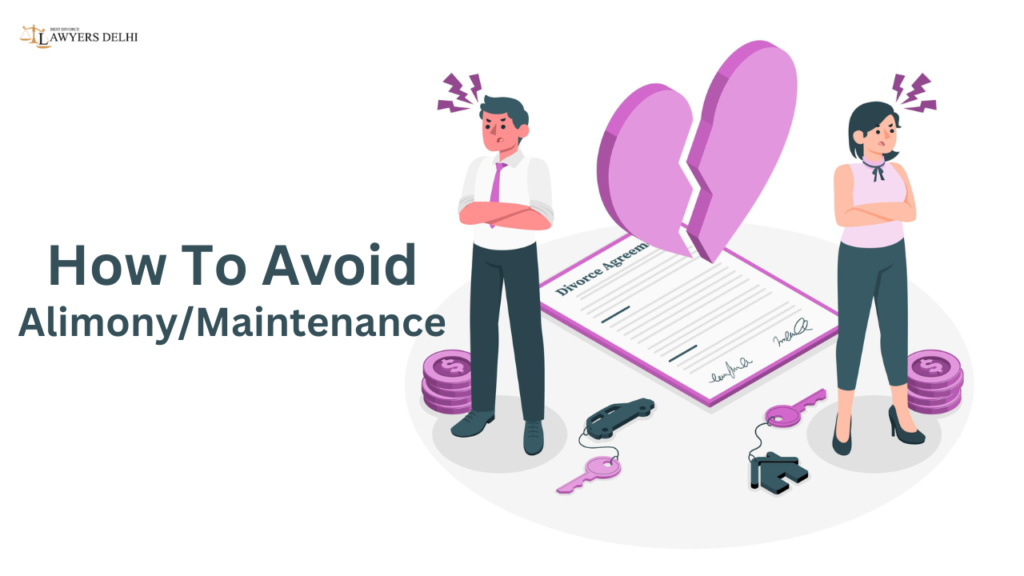
Divorce can be difficult and emotionally taxing; both parties involved must consider both financial and emotional implications carefully before beginning this process. Alimony refers to money owed to one spouse from another after their separation has taken place. Alimony differs from maintenance, which provides cash assistance for basic living necessities. Maintenance can be paid during divorce procedures, particularly if one spouse relies on the other for financial support. Understanding the legal nuances of alimony and maintenance is critical for anyone navigating the complexities of divorce in India. It entails not only the severance of marital relations but also careful assessment of financial obligations that continue after the marriage is terminated.
Alimony is an important problem to talk about during the court process of a divorce. However, Indian divorce applicants, especially women, did not fully understand the concept of the right to claim financial support for post-divorce maintenance a few years ago. People in India are becoming more aware of the many aspects of divorce legislation as the divorce rate rises. The era of feminist initiatives and education development among women has contributed to the increased use of alimony in divorce proceedings.
Alimony, or spouse support, is a legal duty in practically every country globally. It is assumed that both spouses, regardless of gender, must provide maintenance assistance during and after marriage.
Because marriage is inseparable, the concept of alimony gained popularity. marital is regarded as a sacred relationship under marital rules. Once married, one must fulfill the responsibilities and obligations of marriage for life – no matter if their life is apart. No matter if they divorced or not; regardless, the husband still bears responsibility for taking care of his wife regardless. Over time, laws and new information gave women more power, leading them to seek divorce as an unexpected solution when their relationship wasn’t working out as expected. At present, we live in an egalitarian society; therefore, alimony may fall to either party depending on their means. Males tend to assist their former partner during legal proceedings more frequently despite equal treatment by law.
What Are The Legal Grounds For Avoiding Alimony During Divorce?
Maintenance/alimony is a common concern for those going through a legal separation. In India, the sword generally hangs around males because courts presume the wife is financially unable to support herself because she married a guy as a dependent. The principle should not be applied in today’s reality, particularly regarding autonomous women. Men are also responsible for children, parents, and other commitments. All of this places a financial load on males while also causing mental distress as a result of the failing marriage. However, according to the law, the answer to the question ‘Can a guy get alimony in India?’ is yes. Below are some gender-neutral ideas on how to avoid paying alimony in India.
Points On How To Avoid Alimony.
Working Spouse
Alimony legislation mandates a spouse to pay for the maintenance of another spouse if he or she ‘has no independent income sufficient for her or his support’. If the spouse requesting maintenance is self-sufficient in meeting his or her expenses, this can be a compelling reason to avoid alimony in India.
Comparing Salary
The preceding two examples show situations in which either the other spouse works or is qualified to work. Even if both spouses work, and the one seeking maintenance earns significantly more than the other against whom an alimony application is filed, the tables may turn. If the applicant earns a larger salary than the respondent or has other sources of income, the respondent may bring this to the court’s attention. Even if there is no discernible difference in the salaries, the respondent may disclose his or her responsibilities, such as parental support, home loans, and so on.
Separation Without Reason
Sometimes one spouse withdraws from another’s society, which means they no longer live together in their married house. If the other spouse is still ready to prolong the marriage while remaining together as a man and wife, this can be used as a defence in India to avoid paying alimony. As a result, if you are the husband whose wife has left for her maternal home and is demanding maintenance from you, and you do not have any charges of cruelty under 498A or domestic violence, you might suggest to the court that you are willing to stay with the wife and bear all of her expenditures. If she does not return, her husband can legally dodge alimony in India.
Mutual Consent
If the husband and wife have agreed to a mutual consent divorce in India, the divorce terms are normally predetermined. If one of those criteria already specifies that neither spouse will pay any maintenance before or after divorce, that becomes a defence. The spouse seeking maintenance or alimony may allege that the divorcing couple mutually agreed on the terms.
Adultery
When a married person has sexual contact with someone other than their legal partner without their partner’s knowledge or permission, this is called adultery. Although cheating on your partner may no longer be illegal, cheating still constitutes grounds for divorce in India and could even help one partner avoid maintenance/alimony payments altogether if having an affair may have led to such requests from both partners.
Renunciation Of Religion
Alimony regulations in India are strictly applicable under personal law if the couple married according to religious traditions. As a result, if the spouse requesting alimony has renounced one religion and converted to another, the other spouse can escape lump sum alimony in India.
The Previous Divorce Was Faulty
This is an unusual scenario, yet it could be advantageous to someone. If your spouse was previously married and the divorce was acquired via mutual understanding or mere separation, the divorce is not genuine. In such a circumstance, marrying again does not grant the marriage legal legitimacy. As a result, if the circumstances fit and you’re wondering ‘how to avoid alimony in divorce in India?’, the validity of marriage is the answer. You can demonstrate to the court that your marriage is not legally lawful due to a flawed divorce in the first marriage. As a result, you will not be legally obligated to pay maintenance to your spouse.
Invalid Marriage
The Hindu Marriage Act of 1955 and other marriage laws specify various prerequisites for marital legality. If one of these elements is not met in your marriage, you can avoid alimony in India by challenging the validity of the marriage. Examples include marriage without consent, as well as banned or sapid partnerships. Another example is bigamy, which is when a person marries someone while their previous spouse is still alive and the couple remains married (they are not officially divorced).
Remarriage
Alimony rules in India may allow the spouse to receive monthly or periodic maintenance following divorce. However, the provision is conditioned on the spouse receiving such maintenance not marrying another individual. As a result, if you have been paying maintenance to your spouse and have lately learned of his or her remarriage, this is your answer for avoiding alimony payments.
What Difficulties Have You Encountered While Appealing For Avoid Alimony Amount?
If alimony is not paid, the spouse who receives it might take action as well. In India, most wives and moms stay at home, therefore the husband is usually responsible for paying. They will require time to locate work and the resources to maintain themselves and possibly a child or children.
Alimony for child support – The parent who lives with the child might seek alimony until they can maintain the child on their own. The parent must provide documentation to the court that the child is still a juvenile under the age of 18, does not work, and requires financial aid for education. If the child is a legal adult at the age of 18 but still desires to continue their education, their custodian can request financial help from their ex-spouse.
Alimony by the father for the children – If a Hindu couple divorces, the husband is responsible for financially supporting the child, whether legitimate or illegitimate. This falls under Section 20 of the Hindu Adoption and Maintenance Act of 1956. He must also support his wife, and if he fails to do so after the divorce, she may seek alimony.
Alimony if the mother earns – According to a 2019 High Court rule, husbands should support their wives and children after divorce if the wife earns and works hard to raise a child alone. The husband is not required to raise the child daily, so he should provide financial support.
If financial assistance is not provided following the divorce, the parent with custody of the child may seek alimony under the country’s laws. Although it is preferable to pay the money without going to court for alimony, it is occasionally essential for people. Without alimony, single mothers who were housewives, single fathers unable to find work, and many more parents would be unable to support their children or themselves.
Conclusion
As is true of many complex issues related to divorce in India, handling alimony requires both knowledge of law and tactics that do not discriminate based on gender. Alimony was traditionally granted only to wives financially; however, due to changes in society and law, it has become apparent that either partner may receive financial support depending on their specific situation.
Alimony amounts depend on many factors, including each person’s earning capacity and skill set as well as any obligations. You can either avoid or reduce alimony payments by showing that you can support yourself, having access to adequate education, comparing salaries fairly, coming to an agreement where both parties are satisfied or using legal arguments such as adultery or invalid marriage as arguments against paying it.
Avoiding divorce is often challenging; both parties must adapt to new financial realities if there are children involved. Alimony for child support should be carefully considered because it ensures the parent who provides care receives enough funds until their child can support themselves financially. Alimony may be difficult, but it’s an integral component of divorce settlements for financially stable divorcees who sacrificed job prospects due to the marriage or children. With society moving toward greater gender equality, it is vitally important that any alimony issues be handled fairly, openly, and with an eye toward what’s best for all involved – particularly any children affected by it.


